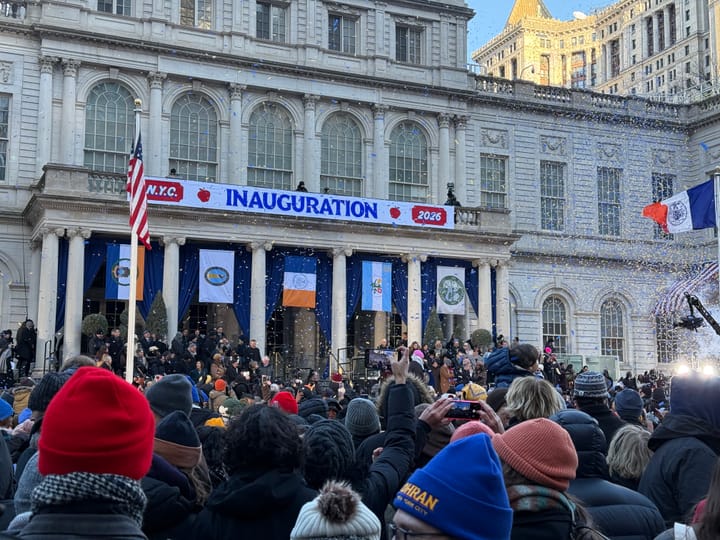We live in dynamic pricing hell. Is there any way out?
'Dynamic pricing' is coming for every single transaction you make, and we want to know how you're dealing with it

Have you managed to beat back the threat of a horrible new casino coming to your neighborhood? Resisted the urge to become a compulsive 24/7 phone gambler even though every app and lawmaker in existence is practically begging you to do it? Well don’t feel too pleased with yourself yet, pal, because if you ever hope to attend any kind of ticketed event, your time as a grimy odds-player is still coming.
It’s hardly news that the market for event tickets is a nightmare — we’ve been living in a hell of Ticketmaster’s making for decades at this point, and the industry has yet to find any meaningful way of cracking down on the predatory and incredibly sophisticated resale market.
But the issue was especially top of mind this week: locally, Zohran Mamdani launched a petition to pressure FIFA into abandoning dynamic ticket pricing for the 2026 World Cup. For the uninitiated, dynamic ticket pricing is essentially Uber surge pricing for event tickets, where platforms can juice their revenue by adjusting prices in real time based on demand (like when an artist’s tour tickets go on sale and you see ticket prices spiking by hundreds of dollars over the course of a minute on Ticketmaster).
The practice is increasingly creeping into every goddamn aspect of our lives as consumers — restaurants are using it! So are some grocery stores! The literal Empire State Building couldn’t resist getting into the mix! Meaning that in addition to almost certainly spending more money on everything, every transaction now carries the stress and indignity of thirstily strategizing and playing the odds, all without even so much as the dangerous-but-enjoyable dopamine rush that you get from actual gambling.
And that’s just for initial sales; the resale market, as anyone reading this undoubtedly already knows, is its own circle of hell. Earlier this month, Ariana Grande announced she wouldn’t be using dynamic pricing for her upcoming tour — some artists are increasingly opting out of the practice in an effort to make shows more accessible to fans — only to be faced with an onslaught of price gouging from resellers the moment her tickets hit the market.
The resale issue recently reared up hyper-locally — for us, the members of Team Groove — as a bunch of elder millennials looking to score tickets to the Rilo Kiley SummerStage show in Central Park last Monday.
Most of us were too cheap to pony up the dynamic price that reached $140 when tickets first went on sale earlier this year. After months of waiting it out, Tim found tickets for $60 on StubHub in July. If we’d all waited it out til the day of the show, however, we could have snagged ‘em for just $38, the lowest price a friend spotted that day, also on StubHub.
This game of timing chicken is increasingly the move for anyone on any kind of budget who hopes to attend any kind of event, ever. Earlier this year, TikToks abounded of people waiting until the day of the show to buy Beyonce’s Cowboy Carter tour tickets at MetLife tickets at a steep discount, and people devote endless time on Reddit to dissecting their timing strategies.
“Unless it’s something I’d be truly upset to miss I generally play secondary market roulette where I wait until six hours before an event before I even look at the StubHubs/SeatGeek, because that’s when people start panicking about not being able to unload tickets,” said friend of the Groove John, who attends shows often enough to, by necessity, keep a close eye on ticket prices to find the best deal possible.
Professional online scalpers usually won’t drop their prices that much, John noted, meaning that the last-minute cheapies are coming from real people who can’t make it to the show and are hoping to recoup at least some of what they paid.
“It does suck that preying on others’ panic is a major way to get reasonable tickets,” he added.
Like so many other elements of our enshittified modern existence, a process that should be straightforward and maybe even exciting is now a fraught negotiation that involves refreshing multiple apps, “optimizing” your timing, and generally bending over backwards to avoid getting gouged.
Artists themselves have taken swings at circumventing the whole depressing system — Maggie Rogers with her 2024 “Box Office Week” of discounted in-person ticket sales at IRL venues; Paul McCartney with his surprise Bowery Ballroom shows back in February, with tickets only available at the box office.
On the political level, it’s unclear if Zohran will leverage the FIFA issue into a larger push for sane ticketing practices (his campaign didn’t respond to a request for comment), and earlier this year Gov. Hochul signed into law new legislation requiring companies to at least tell you when they’ve used an algorithm and your personal data to determine how much they’re charging you (“stab me from the front,” etc.). State Sen. James Skoufis’ proposed anti-reselling legislation has faced heavy pushback from StubHub, along with concerns it could further centralize Ticketmaster’s already psychotic levels of power. As for the Trump administration’s announcement back in March about “ending price-gouging,” well, let your own experience give you an idea of how much traction that’s getting.
We always want to bring you practical solutions here at The Groove, but we have to admit that on this one, we’re all seemingly stuck with this gamified garbage for the foreseeable future. In the interest of knowledge sharing, our question of the week invites you to tell us: what’s your personal strategy for working around surge pricing and the resale market, and have you landed on anything that doesn’t feel completely awful?




Comments ()